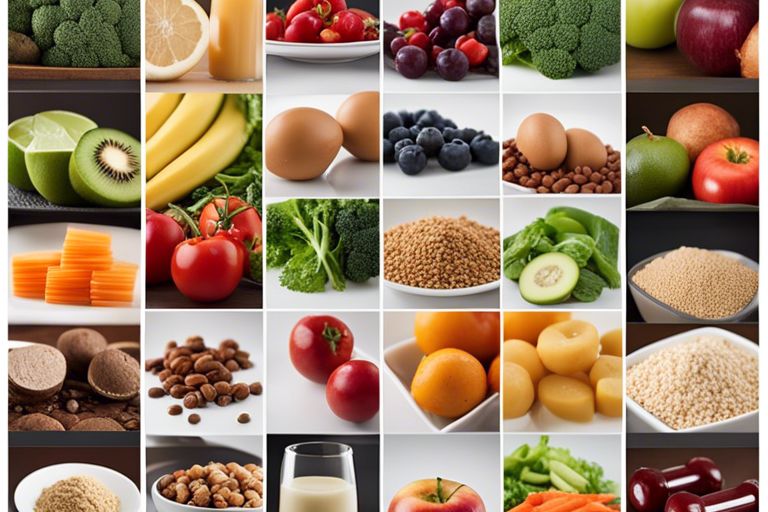The Role Of Nutrition In Supporting Your Strength Training Goals
Strength training requires more than just lifting weights – proper nutrition plays a crucial role in helping you reach your fitness goals efficiently. Fueling your body with the right nutrients is necessary to support muscle growth, repair, and overall performance during strength training sessions. This blog post will investigate into the significance of nutrition in aiding your strength training journey, outlining key dietary considerations to optimize your workouts and maximize results.
Key Takeaways:
- Importance of protein: Protein plays a crucial role in muscle repair and growth after strength training sessions. Ensure you are consuming enough high-quality protein sources to support your muscles.
- Hydration is key: Staying hydrated is important for optimal performance during strength training. Dehydration can lead to decreased strength, endurance, and muscle recovery. Make sure to drink enough water throughout the day, especially before and after workouts.
- Balance your macronutrients: In addition to protein, make sure your diet includes a balance of carbohydrates and fats to provide energy for your workouts and help with overall recovery. Each macronutrient plays a specific role in supporting your strength training goals.
Macronutrients and Their Functions
Now, when it comes to supporting your strength training goals, understanding macronutrients and their functions is crucial. To gain muscle effectively, it’s crucial to fuel your body with the right balance of proteins, carbohydrates, and fats. For a detailed look at how food plays a critical role in strength training, check out Eat to Gain Muscle-The Role Food Plays in Strength Training.
Proteins: Building Blocks of Muscle
An adequate intake of proteins is vital for muscle growth and repair. These macronutrients are the building blocks of muscle tissue and are crucial for post-workout recovery. Incorporating lean sources of protein such as chicken, fish, tofu, and legumes into your diet can help support your strength training goals.
Carbohydrates: Fuel for Your Workouts
Their primary role is to provide energy for your workouts. Carbohydrates are stored in the muscles and liver as glycogen, which is the body’s preferred source of fuel during high-intensity exercise. Ensuring an adequate intake of carbohydrates can help you sustain your energy levels during demanding strength training sessions.
Your body’s ability to perform optimally during strength training is heavily reliant on the availability of carbohydrates. For best results, focus on consuming complex carbohydrates like whole grains, fruits, and vegetables to provide sustained energy for your workouts.
Fats: Essential for Hormone Production
Workouts can take a toll on your body’s hormone balance, which is where dietary fats come into play. Healthy fats are crucial for hormone production, including testosterone which is crucial for muscle growth. Incorporating sources of unsaturated fats like avocados, nuts, and olive oil into your diet can support optimal hormone levels and overall performance during strength training sessions.
Production of key hormones related to muscle growth, recovery, and performance is significantly influenced by the intake of crucial fatty acids. Including a variety of healthy fats in your diet can help maintain hormonal balance and support your strength training goals.
Micronutrients and Hydration
Vitamins and Minerals: Supporting Muscle Function and Repair
After intense strength training sessions, your body requires an adequate supply of vitamins and minerals to support muscle function and repair. These micronutrients play a crucial role in various cellular processes that aid in muscle recovery and growth. Key micronutrients for muscle health include vitamin D, calcium, magnesium, and zinc, which can help reduce muscle soreness and enhance overall performance.
The Role of Water in Strength Training
Supporting optimal hydration levels during strength training is necessary for overall performance and recovery. Water plays a vital role in maintaining electrolyte balance, regulating body temperature, and transporting nutrients throughout the body. Dehydration can lead to decreased strength, endurance, and focus, making it important to prioritize proper hydration before, during, and after your workout sessions.
Role of water intake is also crucial for optimal digestion and absorption of nutrients, which are necessary for muscle repair and growth. Aim to drink water consistently throughout the day and consider adding electrolyte-rich beverages for added hydration support, especially during intense training sessions or hot weather conditions.

Nutritional Strategies for Strength Training
Unlike Nutrition’s Role in Physical Fitness: Why You Need Both, where we discussed the importance of nutrition in supporting your fitness goals, let’s dive deeper into specific nutritional strategies for enhancing your strength training.
Meal Timing and Frequency for Optimal Results
Results matter, especially when it comes to strength training. To optimize your efforts, pay attention to when and how often you eat. Consuming a balanced meal or snack containing protein and carbohydrates within 30 minutes to an hour after your workout can help support muscle recovery and growth. Additionally, spreading your protein intake evenly throughout the day, with three to four protein-rich meals, can aid in maintaining muscle mass and improving overall performance.
Supplements: Do You Need Them?
Need to boost your strength training results with supplements? Before reaching for that bottle of protein powder or creatine, consider whether you truly need them. While supplements may offer some benefits, they are not a substitute for a well-rounded diet. It’s crucial to prioritize whole foods to meet your nutrient needs, and only consider supplementation if you have identified specific deficiencies or with guidance from a healthcare provider or nutritionist.
Diet Adjustments for Different Training Phases
Bulking: Maximizing Muscle Gain
Many individuals use the bulking phase to increase muscle size and strength. This phase involves consuming a calorie surplus to support muscle growth. To maximize muscle gain during bulking, it’s crucial to increase your protein intake to promote muscle repair and growth. Carbohydrates are also important for providing energy for intense workouts, while healthy fats support hormone production and overall health.
Cutting: Losing Fat While Preserving Muscle
Maximizing muscle gain during the bulking phase sets the stage for a successful cutting phase. Many individuals enter the cutting phase to reduce body fat while maintaining the hard-earned muscle mass. It’s necessary to create a calorie deficit by consuming fewer calories than you expend, primarily through a combination of diet and exercise. Maintaining a high protein intake is vital during cutting to help preserve muscle mass while losing fat.
It is important to focus on nutrient-dense foods during the cutting phase to support muscle retention and overall health. Including plenty of vegetables, lean proteins, and complex carbohydrates can help you feel full and satisfied while achieving your fat loss goals. Additionally, staying hydrated and getting enough sleep are crucial for recovery and maintaining muscle mass during this phase.
Final Words
With these considerations in mind, it is clear that nutrition plays a crucial role in supporting your strength training goals. By fueling your body with the right nutrients at the right times, you can optimize your performance, enhance muscle recovery, and ultimately achieve your fitness objectives. Remember to focus on a balanced diet that includes plenty of protein, carbohydrates, healthy fats, and hydrating fluids. Consulting with a nutritionist or fitness expert can also provide tailored guidance to help you reach your desired strength and muscle-building outcomes. Stay consistent and dedicated to both your training and nutritional plan, and you will undoubtedly see progress in your strength and fitness journey.
FAQ
Q: What role does nutrition play in supporting strength training goals?
A: Nutrition plays a crucial role in supporting strength training goals by providing the necessary nutrients for muscle repair, recovery, and growth.
Q: What are the key nutrients needed for supporting strength training goals?
A: Key nutrients include protein for muscle repair, carbohydrates for energy, and healthy fats for hormone production and joint health.
Q: How does protein intake affect muscle growth and recovery?
A: Protein intake is necessary for muscle growth and recovery as it provides the building blocks (amino acids) needed to repair and build muscle tissue after strength training workouts.
Q: Why is hydration important for strength training?
A: Hydration is important for strength training because water is necessary for nutrient transport, energy production, and muscle function. Dehydration can lead to decreased performance and recovery.
Q: How can meal timing impact strength training goals?
A: Meal timing can impact strength training goals by ensuring that your body has the necessary nutrients before and after workouts to support muscle repair and growth. Eating a balanced meal or snack with protein and carbohydrates within 1-2 hours of your workout can enhance recovery and performance.

